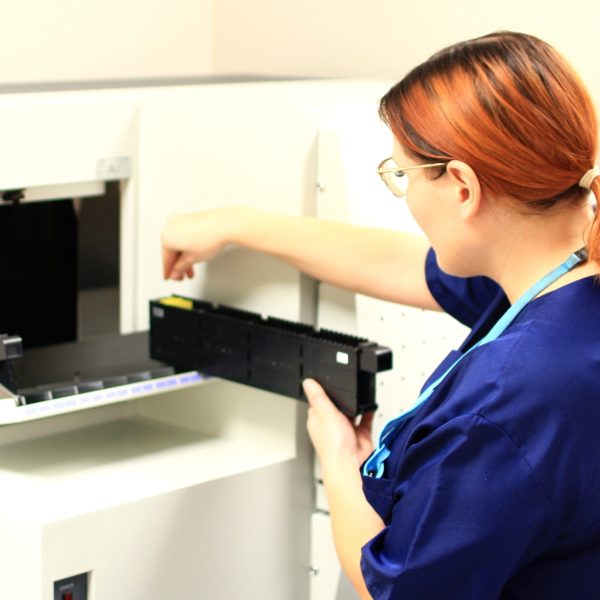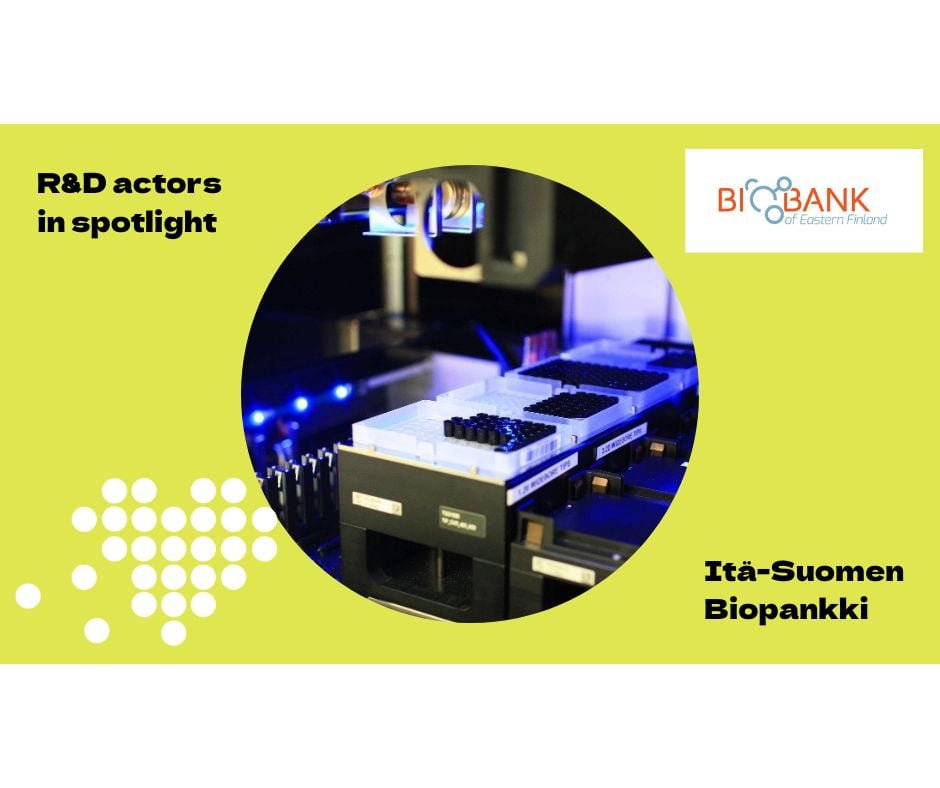The Biobank of Eastern Finland stores samples of human origin and related data for research in health science. To develop biobank activities, the Biobank of Eastern Finland engages in versatile cooperation with other biobanks, researchers and companies in the industry. The biobank’s research interest lies in studies that aim to promote population health, identification of factors affecting disease mechanisms, the prevention of illnesses and the development of products and treatment practices used in nursing or the promotion of well-being and health among the population.
The purpose of biobanks is to promote population health and examine the causes of diseases. Biobanks are used to store samples of human origin and related data to support research. They are an important part of the research infrastructure in society. Finland currently has eleven registered biobanks, some of which operate regionally and others nationally. The Biobank of Eastern Finland operates at both local and national levels and even the international level and also serves as a part of many international networks.
“Of course, the first and foremost task is to provide Finnish citizens with an easy way to participate in improving healthcare operations by giving a sample for the use of the Biobank. The Biobank can disclose its data for any health-promoting research. The second factor is the fact that the Biobank Act requires returning data to citizens. We return data that may have a dramatic effect on a person’s health. This particularly affects the prevention of illnesses as it enables us to identify the risk factors for diseases. People get to receive follow-up healthcare, which results in preventing diseases or treating them in good time. The third important aspect is providing services to companies, academic researchers and research groups so that they get the data and samples they need”, says Professor Arto Mannermaa, research manager at the Biobank of Eastern Finland.
“People have mostly positive attitudes toward the biobank activities in North Savo. So fact, written consent has been collected over 50,000 times. Medical research is typically regarded positively in Finland and people are interested in participating in it”, adds Hanna Kujala, research coordinator at the Biobank.

Liquid processing robot.
Extensive national and international networks
“The Biobank of Eastern Finland operates locally in close cooperation with the wellbeing services county of South Savo, Siun Sote wellbeing services county of North Kartelia and the University of Eastern Finland. FINBB is a cooperative of biobanks owned by Finnish universities and university hospitals. All hospital biobanks in Finland are involved in the FINBB ecosystem. The cooperative aims to create a biobank infrastructure in Finland that is also progressive from an international perspective. Through FINBB, the Biobank of Eastern Finland also belongs to the European BBMRI-ERIC network. Membership in the network is based on a Government decision, and the FINBB cooperative has assumed responsibility for ensuring that the link to the network works smoothly. There is also the Fingenious® network that aims to make it as easy as possible for clients to contact biobanks. Fimea supervises the biobank activities.
“The Biobank of Eastern Finland also has other Europe-wide networks through EU projects. These include a currently ongoing project funded by the Ministry of Social Affairs and Health that aims to map out the expert network that exists within the biobank ecosystem. If we think about the regions of Kuopio and Eastern Finland, we will establish a better network with FICAN East and Neurocenter Finland here as well as with the researchers working at the university, among others”, Mannermaa explains.
The project is based on a need to expand the expert network and make it more concrete. Big international pharmaceutical companies usually wish for extensive services, not only when it comes to materials but also analysis and interpretation. This requires a lot of competence that a larger network can offer more effectively.
Strength in neurological competence and highly valuable sample collections
The Biobank of Eastern Finland transfers the samples it owns and manages and related clinical information for high-quality research in health science and product development based on a request for disclosure. The biobank’s extensive research covers all the medical specialities of KUH. The Biobank of Eastern Finland particularly supports research in the diseases of the circulatory organs, metabolic organs and musculoskeletal organs, neurological diseases and cancers as well as mental health. A further strength of the Biobank of Eastern Finland is its location in a region with a lot of education and activities revolving around the health industry, such as Neurocenter Finland.
“Thanks to the homogenous population base due to the geographical isolation and low migration flows to the region, the sample collections obtained from the region are particularly valuable for research in public health. Finland, particularly Eastern Finland, has been isolated and subject to little inbound migration. Additionally, there has been outbound migration from the region, so the gene pool has remained unchanged”, Kujala explains.
“In terms of population genetics, the basic premise in this region is that a certain group of people with a specific genetic ancestry once came to this region. Coincidentally, this group has disease risk factors that began to increase from the original population. This manifests in many ways, for instance in the risk factors for developing cancer. Overall, when it comes to research in genetics, Finland is famous for utilising our isolated genetic ancestry. The best example of this is the FinnGen project in which biobanks collected the genetic ancestry of 500,000 Finns based on their consent. The genes and risk factors have been determined, and the project included 13 major pharmaceutical companies and has received EUR 150 in funding so far. The Finnish genetic ancestry includes factors that can be explored to determine which drugs should be developed for given diseases. This allows for skipping several drug development phases. This had previously proven to be an excellent combination and has also produced hundreds of medical publications”, Mannermaa adds.
The biobank also has various research projects of its own. Currently, clinical results are distributed to those providing specimen and their experiences related to the process are also examined in this context. The project also includes laying out the process of how to provide this information to the citizens. In research on COVID-19, samples and related data were collected from hospitalised patients. The biobank was also closely involved in a study related to a research project on neurodegenerative diseases. In this study, persons identified based on specific data were invited to a doctor’s appointment and the biobank carried out the collection of blood samples and survey data.
A study by the Biobank of Eastern Finland and the Institute of Clinical Nutrition at the University of Eastern Finland developed a new operating model for collecting lifestyle data with an electronic lifestyle survey and combining this data with biobank data. The active collection of consent for the biobank began at the Women’s Centre, North Karelia Central Hospital in the spring of 2020. The purpose of the maternity clinic services is to safeguard the health and well-being of pregnant women and foetuses and to promote the health of future parents and the whole family as well as health and safety in the environment where the child will grow up. The aim is to promote public health and prevent the complications of pregnancy.

Tissue section glass scanner.
Proficient support and partnership for researchers and companies
The Biobank of Eastern Finland aims to build an effective ecosystem, i.e. a wide network of health industry operators, around its activities. In addition to universities and hospitals, this network should include companies that can produce and purchase biobank services. The Biobank of Eastern Finland discloses the samples it owns and manages and offers related information for high-quality research in health science and product development based on a request for disclosure by those implementing studies. The common goal is to promote health through the activities.
“We encourage prospective partners to contact us already when planning a project, as the biobank can help you at this phase. If the aim is to set up a structural fund project or some other project, we can be involved in the discussions and help you find the right solutions. In addition to having certain kinds of samples and data, we can also launch new data collection processes. Biobank activities are closely connected to healthcare and we can collaborate with the relevant clinics in making a plan on asking patients with a specific illness to participate in the project. In this case, a clinician will be actively involved in the project and the biobank manages sample extraction and transfer. We also receive data from projects that can be utilised in new projects.”
“The Kuopio Health ecosystem and region also has start-ups that develop different devices. When you’re thinking about ways to launch the testing of your devices, you can discuss with the biobank what kind of material you need for the testing. It’s also a good idea to register with the Fingenious.fi website. The Fingenious® service offers access to Finnish biobank data sets and provides seamless access to the specialist services, samples and data by Finland’s public biobanks as well as research subjects for various studies in biomedicine. You can also contact us directly through the service”, Mannermaa and Kujala point out.
Inquiries:
Arto Mannermaa, Research Manager, Professor, arto.mannermaa(at)uef.fi
Hanna Kujala, Research Coordinator, PhD, hanna.kujala(at)pshyvinvointialue.fi

